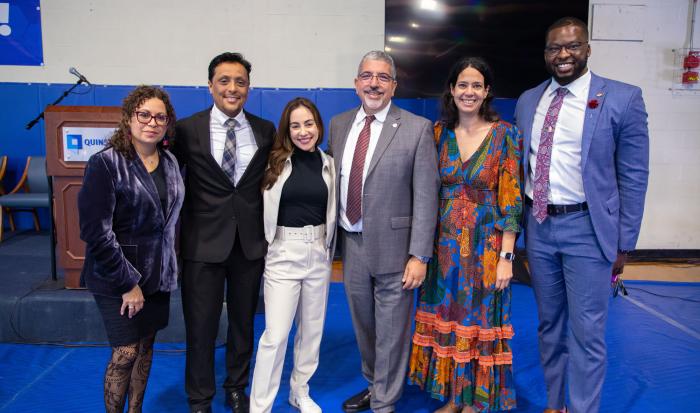
QCC concluded Hispanic Heritage Month with an incredible day of inspiration and connection centered around an inspiring keynote presentation by journalist, author and motivational speaker Mariana Atencio.
"Representation matters," said QCC President Dr. Luis Pedraja in his welcoming remarks. "I want to help all minoritized populations so that everyone feels like they belong and their voices are heard. Hispanic Heritage Month helps us realize that. We need hope and I think education can do that for us."
Atencio told the crowd how growing up in Venezuela, she watched the societal and democratic institutions of the country crumble around her. By the time she was in college, she was part of a large movement of student protestors who spoke out about issues such as the government shutting down the largest news outlet in the country. It was through these experiences that she recognized her desire to be a journalist.
She moved to the U.S. and worked her way up to some of the biggest news channels in the country, eventually starting her own media company. While she has found success and acknowledges some of the privileges that she possessed, it wasn't always easy. She recalled in the beginning of her career that she would lighten her hair and pronounce her own name differently to fit in.
When Atencio was invited to the White House Correspondents dinner, her manager told her not to dress "too Latina." It was a hurtful thing to hear from someone in a position of power and overshadowed the entire experience for Atencio.However, she ended up having a constructive conversation with the person and it became a learning moment, which Atencio stressed as a way to advocate for counsel culture, not cancel culture.
"As a journalist, authenticity is my currency. Why do we love authentic people but find it hard to be that way ourselves all the time? Because we're wired to fit in," Atencio said.
Atencio told the audience a story about a recent New Year's Eve where she was alone and not feeling great, but went through elaborate efforts to make it look like she was having the time of her life on social media. While she felt an immediate validation from likes and comments, she ended up losing followers who saw through the façade.
"I lost their trust," Atencio said. "We don't need role models, we need real models."
Atencio eventually realized it was important to be intentional and proud of who she was. She advised people in leadership roles to be conscious of this and how even small things like asking someone how to correctly pronounce their name can go a long way.
To emphasize her point of being proud of who you are as an individual, Atencio had everyone in the audience fill out a card with what makes you special and invited participants to share their responses with the crowd.
"You all have a story worth telling," she said.
The event also included an engaging panel of local Latine leaders Germán Chiriboga, program director of Health Equity and Story Telling at UMass Medical School, Elena Quiroz-Livanis, chief of staff and assistant commissioner of Academic Policy and Student Success at Massachusetts Department of Higher Education and Dr. Lorna Rivera, director of the Mauricio Gastón Institute for Latino Community Development & Public Policy at UMass Boston. The panel was moderated by Vice President of External Affairs Dr. Viviana Abreu-Hernandez.
For Quiroz-Livanis, policy equals power and where organizations put their funding is a signal of what is important to them.
"So much of who I am is about the transitional power of education, but the systems are not designed for us, so you have to work hard but it's also about luck. Access to higher education shouldn't be about luck. We have incredible things in place in Massachusetts but we need to get access to it," said Quiroz-Livanis.
Rivera told her story, which was a prime example of the hard work and luck that Quiroz-Livanis referenced. Through a chance encounter with a professor who had met Rivera's family while conducting research on gangs, she was able to acquire a research job that got her into higher education, eventually going on to get a Ph.D. She also noted that a recent positive change in Massachusetts was the passing of the data equity bill, which will collect research about subgroups to give a more nuanced picture of diverse populations.
Chiriboga recounted his time in college in Ecuador when he was thrown into a completely different social class and how difficult it was for him. He eventually transferred to Worcester State University and felt like he could finally be himself.
"I love my accent, my brown face. This informs my research. I think we need to be introspective about how we see ourselves and put ourselves in society," he said.
Atencio echoed the messages of these local leaders during her keynote with a powerful message, "Creating community is the only way to heal the country and the world and it starts with education."
